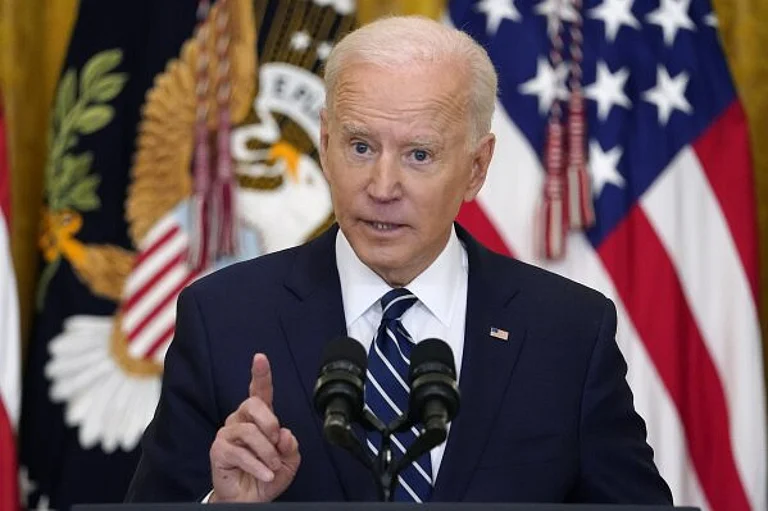The prospect of West Asia engulfed in another war has become very real with the latest missile and drone attacks on Israel by Iran. Tension in the region is rising and a full-scale war between Israel and Iran could have widespread ramifications and bring in the US and its European allies into the fray.
Iran's Strikes On Israel Spark Fears Of Wider Conflict In The Middle East
Iran’s actions have helped Netanyahu’s government to turn the spotlight from its actions in Gaza that had come in for criticism even from loyal friends like US President Joe Biden to Iran.
Ever since Israel’s war on Gaza, experts had warned of the conflict spreading through the oil-rich region that could have a devastating effect on the world economy but that had not happened. Despite Houti strikes on the Red Sea traffic and skirmishes in Lebanon’s border with Israel, the conflict had not spread despite simmering tension and popular Arab anger against Israel’s action.
But that changed on April 1, with the deadly bombing of Iran’s Consulate in Damascus that killed twelve people including seven officials and two senior generals of Iran’s elite Revolutionary Guards (IRGC). Iran blamed Israel for the bombing of its embassy complex on April 1, and vowed to retaliate. It did just that late Saturday. The result is the hundreds of missile and drone attacks on Israel. Most of them have been intercepted by Israel, US and Jordan, but the die is cast. The question is what next?
A war between Iran and Israel will have consequences for the world, especially the developing nation. For India which has major interests in the region and has a nearing 9.5 billion people working in the region the latest development is cause for concern. The MEA has called for "... immediate de-escalation, exercise of restraint, stepping back from violence and return to the path of diplomacy… It is vital that security and stability are maintained in the region."
“India has every reason to be concerned with Iran-Israel tensions. The whole international community should agitate for a de-escalation in Tel Aviv,” says Ambassador Talmiz Ahmad who served in the region and closely tracks developments in West Asia.
"India should be an active role-player in the region because of its relevance to our seaborne trade and energy security. But the most important factor for India is the safety of our community in the region," says Ahmad.
What is surprising is Iran’s action. Tehran knows very well that it is falling into Israel’s trap. It suits Benjamin Netanyahu to divert global attention from its actions in Gaza that has come under enormous criticism from global leaders including staunch ally Joe Biden. Since Iran’s action messages of support for Israel is pouring in from Western leaders. The US is standing like a rock with Israel.
Knowing all this why the normally astute Iranian leadership went in for a direct confrontation with Israel. Earlier it had avoided direct confrontation. Instead, Iran allowed its proxies, Hezbollah in Lebanon, the Houthis in Yemen, Hamas and Islamic Jihad in the Gaza strip, Shiite militant groups in Iraq and Syria to do the work.
The shadow war between Israel and Iran has gone on for years with Israel getting some of Iran’s top military general and scientists. In November 2021, Iran’s top nuclear scientist Mohsen Fakhrizadeh was killed. This year alone IRGC commander Sayyid Raza Moussavi killed by a missile strike (January 1) and the April 1 attack in the Iranian consulate in Damascus got seven military leaders.
Experts say it could be because of domestic pressure. The regime cannot be seen as weak. One of those killed in the attack on the Iranian embassy in Damascus was Mohammed Reza Zahedi, a former commander of the IRGC’s ground forces, air force, and the deputy commander of its operations. He is the second most important Iranian military general to be killed since Qassem Soleimani’s targeted killing by the US in Baghdad.
Was Iran’s action propelled by a need to send a message to the regime’s domestic constituency that it is strong and in control? Or was it to appease the all-powerful revolutionary guards angry and restive after the Damascus targeted killings of the military?
"There is no domestic constituency for conflict in Iran except amongst military hardliners," says Syed Akbaruddin, India’s former envoy to the UN. "The move plays into Israel’s hands. That said, I suppose Iran is under pressure that it can’t be seen as not responding to Israel’s assertive moves against senior military personnel. The US acting against Iran is something it can digest. However, letting Israel go without a response is not what the Iranian military perhaps finds acceptable. Hence Iran seems to have gambled to establish deterrence. While much will depend on Israel’s response, there is no way out in which Iran can come out victorious from this,’’ Akbaruddin explains.
Iran has few friends in the region. Though the Chinese have brokered a peace between Saudi Arabia and Iran in 2023, and Tehran has been welcomed back to the fold, none of the Arab leaders will come to Iran’s aid if a full scale war breaks out. Russia a long time friend of Iran is occupied with the Ukraine war, and Syria is too weak to make a difference. China may support with statements but unlikely to get involved. Israel on the other hand has the full backing of the US and the Western powers.
Iranian military chief, Major-General Mohammad Bagheri, is quoted by Iranian state TV as saying that a “much larger” response awaits Israel “if it retaliates against Iran”. Bagheri said that Iranian attack on Israel “has achieved all its goals, and in our view the operation has ended, and we do not intend to continue”. Despite the bluster and the strong words, he has sent out the message that the action has ended.
But Israel is not likely to take this lying down.

